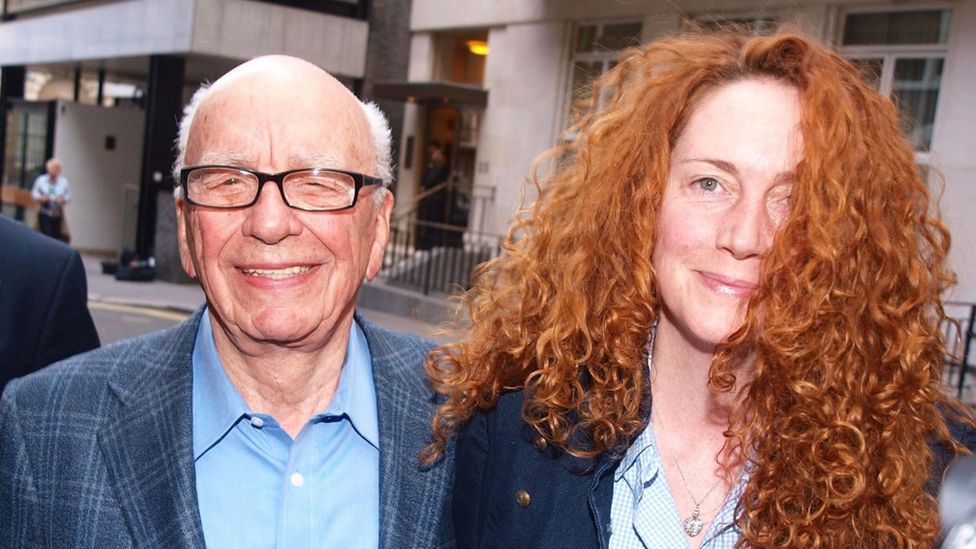Rupert Murdoch must have known of phone hacking, High Court hears
- Published

Rupert Murdoch must have known of phone hacking and other unlawful activity at his newspaper group before publicly denying it, the High Court has heard.
Lawyers for Prince Harry told a hearing his damages claim next year will seek to link News Group Newspapers (NGN) executives to knowledge of hacking and other unlawful activity.
Prince Harry's lawyers are seeking permission to update parts of his case.
NGN's lawyers have argued changes to claims are "wholly unnecessary".
The publisher's News of the World tabloid was closed down in 2011 over hacking and its former editor Andy Coulson was later jailed for his part in the affair.
No case has ever been proven against his bosses.
NGN, also the publisher of The Sun, has faced claims of phone hacking or other unlawful intrusion from more than 1,300 people.
But, Prince Harry is one of a handful of other alleged victims of tabloid press intrusion who have so far refused to settle.
A judge previously ruled the duke ran out of time to sue specifically for alleged interception of his mobile phone voicemails - but his claim of unlawful intrusion by private investigators working for newspapers is likely to continue to trial next January.
During Wednesday's hearing, Prince Harry's lawyers said their investigations - and court disclosures from NGN itself - meant they should be allowed to put more allegations before the court, naming specific key figures in the company who knew about the types of intrusion the duke and others experienced.
In July 2009, the Guardian newspaper published detailed allegations of widespread unlawful activity at the News of the World. The tabloid's owners hit back with a detailed rebuttal - including denials any executives knew of wrongdoing.
At the High Court hearing, Prince Harry's lawyers said that denial had been published despite the company's top people, up to the board, knowing it had been wrong.
"The Claimants will seek the inference that Rupert Murdoch... was told about the Guardian allegations ... and knew that the denial published by his company... was false or, at the very least, turned a blind eye to its veracity and that of the allegations," they said in legal papers.
But, in written submissions, lawyers for Prince Harry claimed a trail of evidence linked individual incidents of hacking to top NGN figures.
In one incident, it is claimed the final editor of the News of the World had confirmed to police in a witness statement that both his boss, Rebekah Brooks, and owner Mr Murdoch had known about hacking by early 2011 - because he had passed on a confession from a reporter.
Mr Murdoch later told the Leveson public inquiry into the hacking affair he had been the victim of a cover-up and the truth had been hidden from him.
David Sherborne, for Prince Harry, told the court that part of the duke's case at trial would be detailed allegations of the disappearance of a computer hard drive belonging to Rebekah Brooks.
The court heard that the newspaper group had allegedly given a "false" account to the police about the circumstances of how that drive had gone missing as part of a plot to conceal and destroy evidence.
When police asked for the drive, Mr Sherborne said they had been given a different unit - despite an IT contractor having alerted colleagues that the true unit had disappeared from a secure storage room.
Allegations denied
Anthony Hudson KC, representing NGN, said if the court allowed new allegations into the case it would be substantially unfair to the company - and amounted to an unwarranted campaign against the tabloid press.
"They appear to be designed to precipitate a politically fuelled quasi-public inquiry, and not to assist the court with its actual function of determining - in individual claims - whether there has been misuse of private information and, if so, how much compensation should be paid," he said.
There is no certainty the claims made about Mr Murdoch or other top figures at NGN will be examined at trial.
NGN says the case must focus on whether stories about Prince Harry included genuinely private information - and claims about executives are a campaign against tabloid newspapers.
A spokesperson for the publisher said: "Today the claimants have sought to introduce accusations to the civil court against many current and former journalists, staff and senior executives of News International in a scurrilous and cynical attack on their integrity.
"Some of these allegations date back to events now 30 years old and relate to allegations which are irrelevant to the matters which are now in issue between the parties. Many of these have been investigated in depth on previous occasions.
"These allegations have nothing to do with seeking compensation for victims of phone hacking or unlawful information gathering and should be viewed with considerable caution not only in relation to their veracity but also in the light of those who are behind them."
The case continues until Friday.
Related Topics
- Published9 February
- Published9 February
- Published15 December 2023
- Published15 December 2023